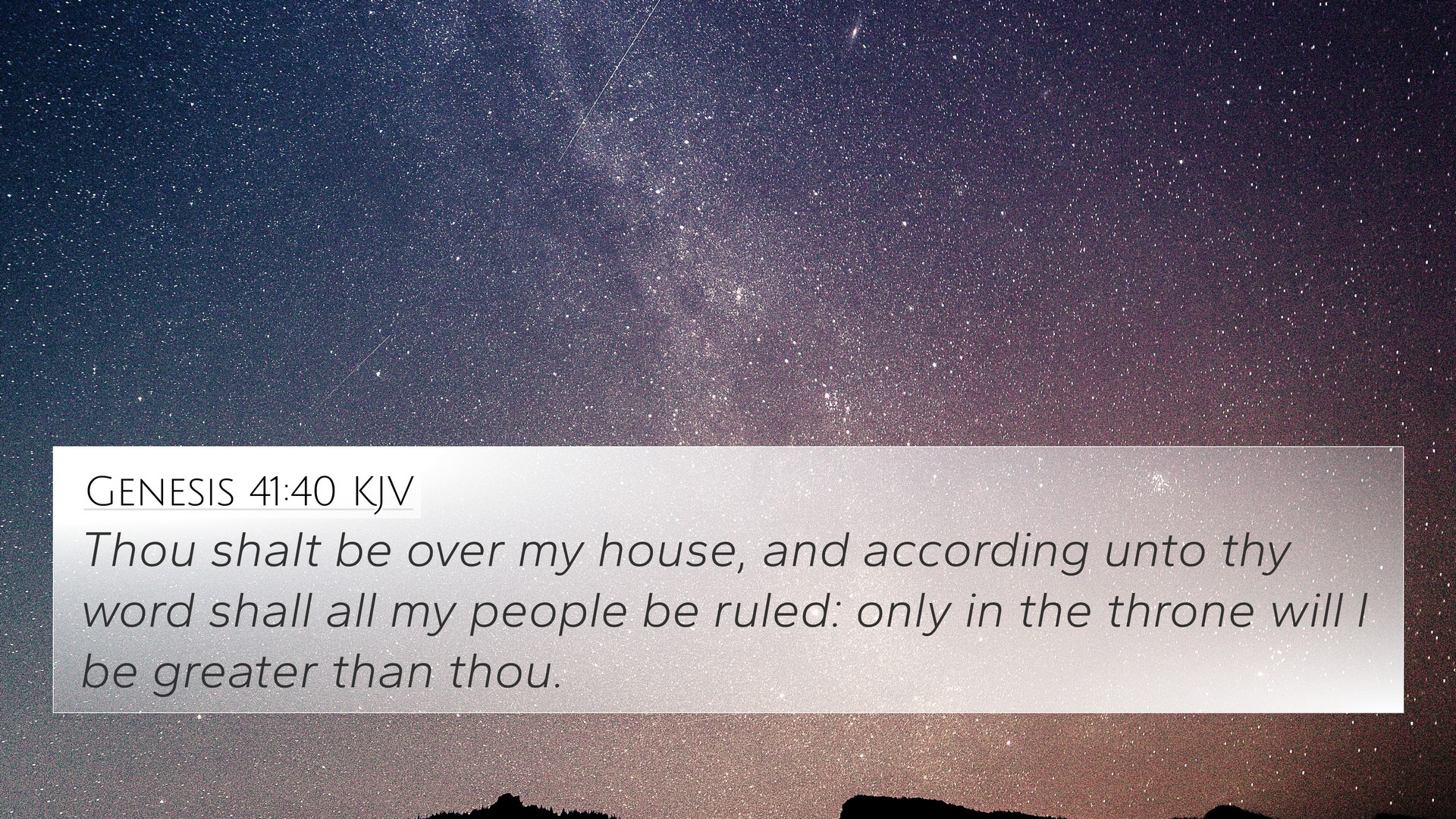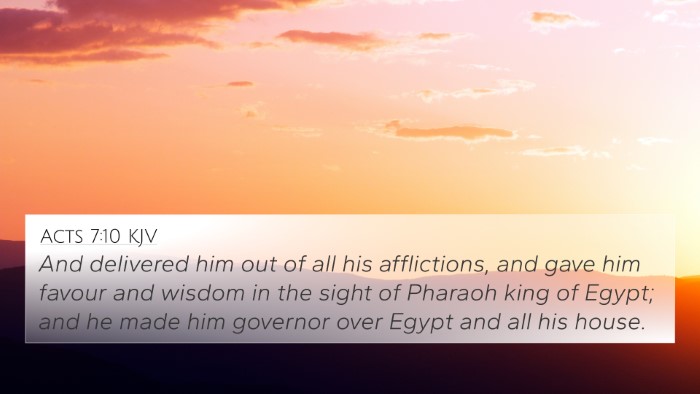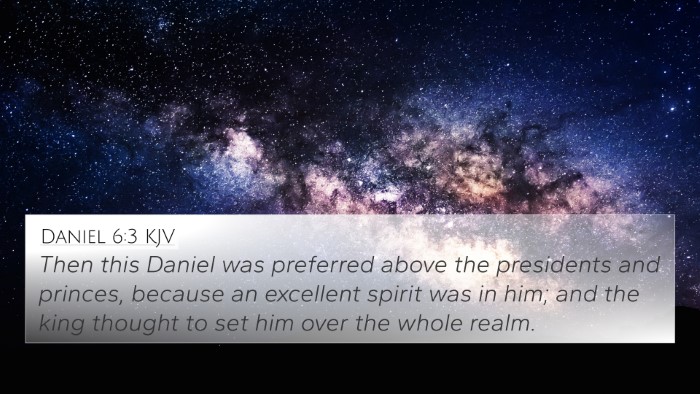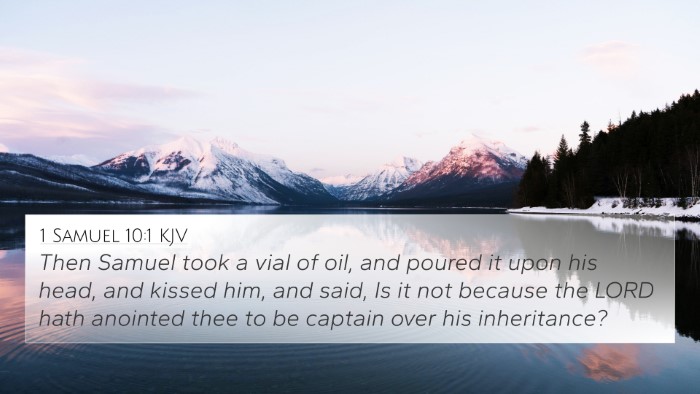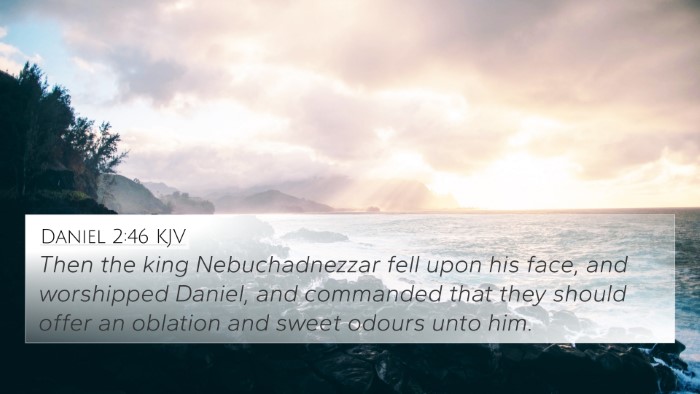Understanding Genesis 41:40
Verse: "Thou shalt be over my house, and according unto thy word shall all my people be ruled: only in the throne will I be greater than thou." (Genesis 41:40)
This verse occurs during the moment when Joseph, after interpreting Pharaoh's dreams, is elevated to a position of power in Egypt. Pharaoh entrusts him with authority over all of Egypt, signifying a dramatic turnaround in Joseph's life.
Summary of Meaning
In this passage, we see how God's providence directs the course of history and the lives of individuals. Joseph, who was once a slave and a prisoner, is now appointed as second-in-command only to Pharaoh. This not only highlights the fulfillment of God’s promises in Joseph’s life but also serves as a broader metaphor for divine justice and purpose.
Insights from Public Domain Commentaries
Matthew Henry
Matthew Henry emphasizes the importance of God's favor in Joseph's elevation. He notes that despite Joseph’s trials, God orchestrated circumstances that led to his rise. Joseph’s wisdom and integrity made him trustworthy in Pharaoh's eyes, resulting in his authoritative position. Henry stresses that this event serves as a testament to God's sovereignty and ability to turn one’s afflictions into a place of honor.
Albert Barnes
Albert Barnes points out the extraordinary nature of Joseph's promotion. He notes that Pharaoh recognized Joseph's distinct skills, particularly his foresight and administrative capabilities in planning for the coming famine. Barnes argues that this verse marks a critical moment in biblical history, illustrating how God can elevate the humble and provide for His people during difficult times.
Adam Clarke
Adam Clarke highlights the significance of Joseph being made ruler over Pharaoh's house. He discusses the implications of Joseph’s new role, where not only does he oversee resources, but he also becomes a key figure in shaping Egypt's political and economic landscape. Clarke also notes that this elevation is part of God’s plan to sustain both Egypt and Joseph's own family during the impending famine.
Cross-References and Connections
- Genesis 37:36 - Joseph sold into slavery in Egypt.
- Genesis 39:20-21 - Joseph imprisoned but favored by God.
- Genesis 40:14-15 - Joseph interprets the dreams of Pharaoh’s officials.
- Genesis 45:8 - Joseph reveals his identity, showcasing God's providence.
- Psalm 105:17-19 - God sent Joseph ahead to preserve life.
- Romans 8:28 - All things work together for good to those who love God.
- 1 Peter 5:6 - Humble yourselves, and He will exalt you in due time.
Thematic Connections
This verse embodies themes of divine elevation, providence, and the fulfillment of promises. Joseph's transition from the pit to power serves as a metaphor for spiritual restoration and the realization of God’s plans through adversity. Such themes resonate throughout the scriptures, revealing God's ongoing relationship with His people and His ability to transform pain into purpose.
Implications for Today
For contemporary readers, Genesis 41:40 serves as encouragement that faith and perseverance through trials can lead to unexpectedly favorable outcomes. Joseph's story is a reminder of the importance of integrity and wisdom in leadership roles, both in secular and spiritual contexts. As believers navigate their own hardships, this verse assures them of God's hand in directing their paths for greater purposes.
Conclusion
Genesis 41:40 encapsulates a moment of profound transformation, illustrating the culmination of Joseph’s trials into triumph. By examining this verse alongside other scriptures, we can gain insights into the ways God works in history and individual lives. It encourages cross-referencing with other biblical texts, as it enriches our understanding of the connections within Scripture. Tools for Bible cross-referencing can assist in exploring these themes further, enabling a deeper grasp of how various passages relate to one another and revealing the overarching narrative of God’s redemption.
